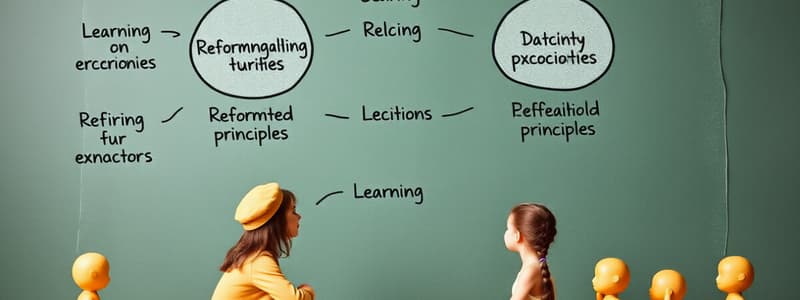Podcast
Questions and Answers
What are learning theories?
What are learning theories?
- A collection of random facts
- Methods of memorization
- Sets of guidelines that provide meaning to events (correct)
- Only applicable in classroom settings
What encourages the repetition of a satisfying stimulus?
What encourages the repetition of a satisfying stimulus?
The tendency to repeat the response to a satisfying stimulus.
What is reinforcement in the context of basic principles of learning?
What is reinforcement in the context of basic principles of learning?
Immediate, positive reinforcement through praise, reward, or recognition.
What does overlearning do to memory?
What does overlearning do to memory?
What do verbal and non-verbal associations provide?
What do verbal and non-verbal associations provide?
How does cognitive-perceptual readiness affect learning?
How does cognitive-perceptual readiness affect learning?
What is essential for a successful learning process?
What is essential for a successful learning process?
What is required for chain behaviors?
What is required for chain behaviors?
What are cognitive constructs?
What are cognitive constructs?
What do students do during multiple discrimination and generalization?
What do students do during multiple discrimination and generalization?
What are prerequisites to principles of learning?
What are prerequisites to principles of learning?
What skills fall under critical thinking?
What skills fall under critical thinking?
What does flexibility in learning allow students to do?
What does flexibility in learning allow students to do?
What does feedback about performance improve?
What does feedback about performance improve?
How can balanced growth and development enhance learning?
How can balanced growth and development enhance learning?
What does learning being a treasure within imply?
What does learning being a treasure within imply?
What is the focus of 'learning to know'?
What is the focus of 'learning to know'?
What does 'learning to do' emphasize?
What does 'learning to do' emphasize?
What is the goal of 'learning to live together in peace and harmony'?
What is the goal of 'learning to live together in peace and harmony'?
Flashcards are hidden until you start studying
Study Notes
Learning Theories
- Guidelines that help individuals understand events or situations.
- Provide foundational knowledge for the teaching-learning process.
Basic Principles of Learning: Satisfying Stimulus
- Responses to satisfying stimuli are likely to be repeated in similar circumstances.
Basic Principles of Learning: Reinforcement
- Positive reinforcement (praise, reward, recognition) promotes successful behavioral changes.
- Negative reinforcement can slow behavior frequency.
Basic Principles of Learning: Overlearning
- Increases memory retention and enhances learning performance.
- Frequent practice solidifies learned principles and is reflected in students' behavior.
Basic Principles of Learning: Verbal and Non-verbal Associations
- Practical knowledge creates meaningful links between reality and ideals.
Basic Principles of Learning: Cognitive-Perceptual Readiness and Motivation
- Desire to learn aids comprehension and retention, while lack of interest complicates the learning process.
Basic Principles of Learning: Ordering of Information
- Systematic presentation of material aligns with students' readiness, encouraging active learning.
Basic Principles of Learning: Stimulus-Response Association
- Essential for chaining behaviors; mere repetition is insufficient for establishing connections.
Basic Principles of Learning: Cognitive Constructs
- Focus on perceptual imagery and recognition of features like form and texture.
Basic Principles of Learning: Multiple Discrimination and Generalization
- Students analyze and assess relevance of events to current practices, retaining useful information.
Basic Principles of Learning: Previous Knowledge
- Concept acquisition and recall of prior knowledge are prerequisites for learning.
Basic Principles of Learning: Critical Thinking Skills
- Involves perceptual awareness, memory, association, generalization, and decision-making processes.
Basic Principles of Learning: Flexibility and Adaptation
- Students must be flexible to change and adapt to different situations, enhancing learning speed.
Basic Principles of Learning: Feedback
- Constructive feedback improves understanding by clarifying why and how topics are learned.
Basic Principles of Learning: Balanced Growth and Development
- Learning is optimized by aligning activities with learners' developmental levels and preferences.
Phases of Learning: Learning is a Treasure Within
- Encourages individuals to seize lifelong learning opportunities to enhance knowledge, skills, and adaptability.
Phases of Learning: Learning to Know
- Focus on integrating broad knowledge with in-depth analysis, emphasizing mastery over mere acquisition.
Phases of Learning: Learning to Do
- Competence acquisition enables handling various situations and promotes teamwork and personal development.
Phases of Learning: Learning to Live Together
- Learning is an ongoing, holistic process aimed at fostering mutual respect and harmonious coexistence.
Studying That Suits You
Use AI to generate personalized quizzes and flashcards to suit your learning preferences.




